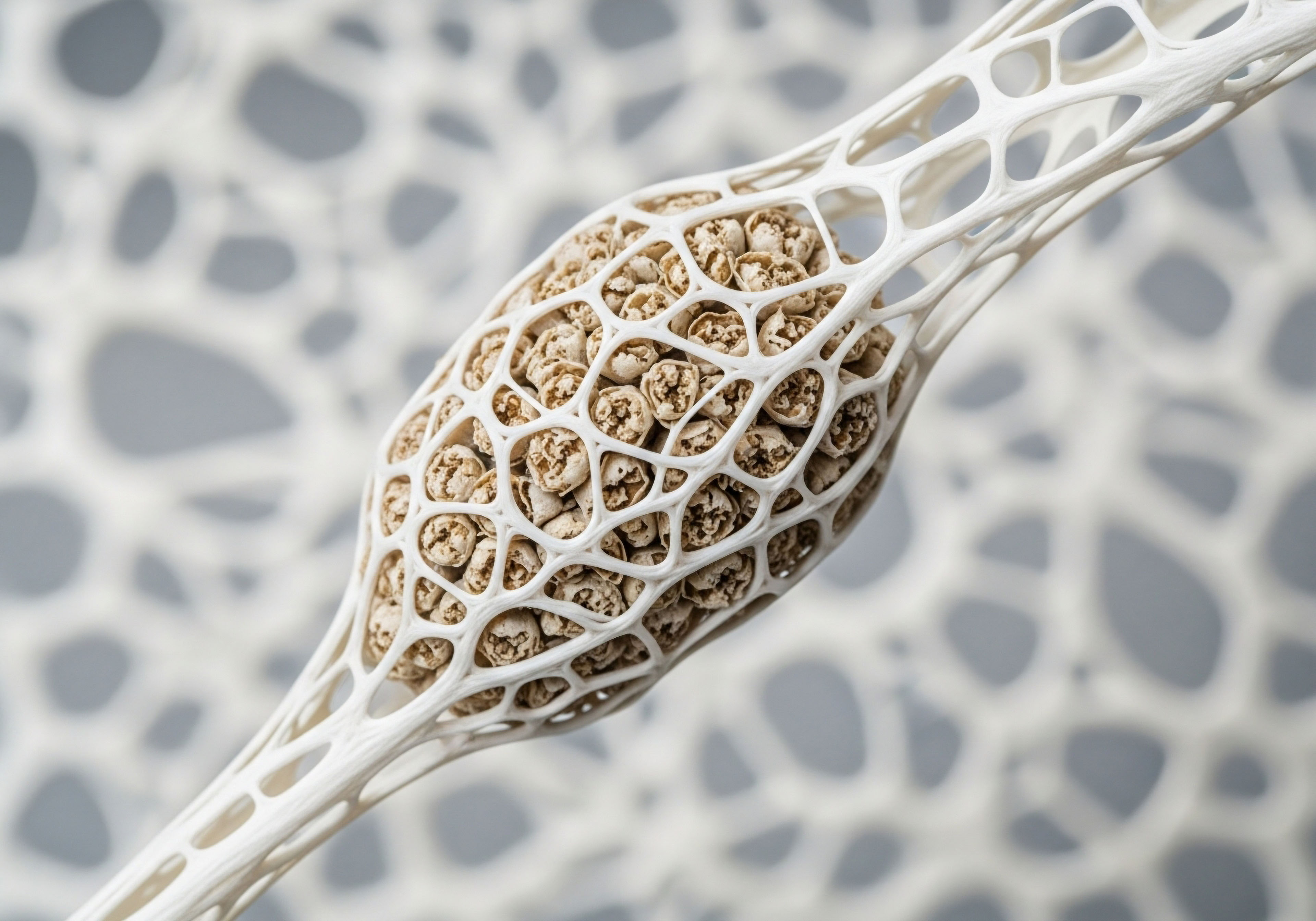

Fundamentals
Have you found yourself searching for a word that used to come easily, or perhaps walking into a room and forgetting why you entered? Do moments of mental fogginess or a general slowing of thought processes leave you feeling disconnected from your usual sharpness?
These experiences, often dismissed as mere signs of aging or stress, frequently mark the subtle yet profound shifts occurring within your biological systems during perimenopause. This transitional phase, preceding the cessation of menstrual cycles, represents a significant recalibration of the body’s internal messaging service, particularly its endocrine components. Understanding these changes is the first step toward reclaiming mental clarity and overall vitality.
The brain, a highly metabolically active organ, relies on a precise balance of chemical messengers to maintain optimal function. Among these, steroid hormones play a particularly significant role. During perimenopause, the ovaries begin to produce hormones like estrogen and progesterone in an increasingly erratic fashion, leading to fluctuations that can directly influence brain activity.
These hormonal shifts are not merely reproductive; they are systemic, affecting everything from mood regulation to cognitive processing. The feeling of being “off” or experiencing lapses in memory is a valid symptom of these underlying biological adjustments.

The Brain’s Hormonal Receptors
Estrogen, specifically estradiol, exerts widespread influence across various brain regions crucial for learning, memory, and executive functions. Areas such as the hippocampus, involved in memory formation, and the prefrontal cortex, responsible for decision-making and planning, possess numerous estrogen receptors. When estrogen levels fluctuate or decline, the communication pathways within these regions can become less efficient. This can manifest as difficulties with verbal recall, processing speed, and attention, symptoms commonly reported by women navigating perimenopause.
Progesterone also acts as a vital neurosteroid, with receptors found throughout the central nervous system. Its influence extends beyond reproductive functions, contributing to neuronal health and stability. The brain itself can synthesize progesterone from cholesterol, underscoring its importance for intrinsic neural processes. A decline in progesterone production during perimenopause can therefore affect neural repair mechanisms and overall brain resilience.
Perimenopausal cognitive changes, such as memory lapses and mental fogginess, often stem from fluctuating estrogen and progesterone levels directly impacting brain function.

Perimenopause and Cognitive Shifts
The period leading up to menopause is characterized by significant hormonal variability, rather than a steady decline. These fluctuations are thought to contribute more acutely to cognitive symptoms than the eventual low, stable levels of hormones in postmenopause. Women often report subjective cognitive complaints, including difficulties with verbal memory, attention, and processing speed, during this time. Objective cognitive testing can confirm subtle changes in these domains, correlating with the erratic patterns of estradiol and follicle-stimulating hormone (FSH).
The impact of these hormonal changes extends to neurotransmitter systems. Estrogen, for instance, supports the integrity of cholinergic projections, which are vital for attention and memory processes. A reduction in estrogenic support can compromise cholinergic tone, contributing to the early cognitive symptoms observed. Similarly, estrogen modulates serotonergic and dopaminergic functions, influencing mood, motivation, and executive function. The interconnectedness of these systems means that hormonal shifts can ripple throughout the brain, affecting multiple aspects of mental well-being.
Understanding these foundational biological principles provides a framework for addressing perimenopausal cognitive concerns. It validates the lived experience of women who feel their mental sharpness diminishing, offering a scientific explanation for what might otherwise be dismissed as an inevitable part of aging. Recognizing the intricate relationship between hormones and brain function is the first step toward exploring targeted support strategies.


Intermediate
Navigating the complexities of perimenopausal cognitive changes requires a precise, evidence-informed approach to hormonal support. The goal is not simply to replace hormones, but to recalibrate the endocrine system, allowing the brain to regain its optimal functional capacity. This involves understanding how specific hormonal agents interact with neural pathways and how personalized protocols can address individual biochemical needs.

Targeted Hormonal Optimization Protocols
Hormonal optimization protocols aim to restore physiological balance, thereby supporting cognitive function. These protocols are highly individualized, considering a woman’s unique symptom presentation, laboratory values, and overall health profile. The timing of intervention, often referred to as the “critical window,” plays a significant role in the potential cognitive benefits of hormonal support.

Estrogen and Progesterone Applications
For many women, targeted estrogen and progesterone support forms the cornerstone of perimenopausal management. Estrogen, particularly estradiol, has demonstrated neuroprotective effects, influencing brain regions involved in memory and learning. When initiated in midlife or close to the onset of menopause, estrogen therapy has been associated with improvements in verbal memory.
Progesterone, often administered alongside estrogen, offers distinct benefits for brain health. Classified as a neurosteroid, progesterone contributes to the growth and repair of myelin, the protective sheath around nerve fibers, and can shield the brain from damage. Its metabolic product, allopregnanolone, is known for its calming properties and potential to enhance memory. The choice of progesterone formulation is also important; natural progesterone is distinct from synthetic progestins, which may have different effects on the brain.
A typical protocol for female hormone balance during perimenopause might involve ∞
- Testosterone Cypionate ∞ Administered weekly via subcutaneous injection, typically 10 ∞ 20 units (0.1 ∞ 0.2ml), to address symptoms such as low libido, mood changes, and cognitive fogginess.
- Progesterone ∞ Prescribed based on menopausal status, often in a bioidentical form, to support sleep, mood, and neuroprotection.
- Pellet Therapy ∞ Long-acting testosterone pellets may be considered for sustained delivery, with Anastrozole included when appropriate to manage estrogen conversion.

Testosterone Support for Women
While often associated with male health, testosterone plays a vital role in female physiology, including cognitive function. As women transition through perimenopause, their testosterone levels can also decline, contributing to symptoms like reduced mental clarity and energy. Targeted testosterone support for women involves carefully calibrated dosages to restore physiological levels without inducing androgenic side effects.
Pilot studies indicate that transdermal testosterone therapy can lead to significant improvements in mood and cognitive symptoms in perimenopausal and postmenopausal women. While more extensive randomized controlled trials are needed to fully establish its cognitive benefits, anecdotal and preliminary clinical data suggest a positive impact on mental sharpness and overall well-being.
Personalized hormonal support, including estrogen, progesterone, and low-dose testosterone, can help recalibrate brain function during perimenopause, with timing of intervention influencing outcomes.

Growth Hormone Peptide Therapy and Other Peptides
Beyond traditional steroid hormones, certain peptides offer additional avenues for supporting metabolic function and overall vitality, which indirectly influence cognitive health. These agents work through different mechanisms, often stimulating the body’s own production of growth hormone or targeting specific physiological processes.
Growth hormone peptides, such as Sermorelin, Ipamorelin / CJC-1295, and Tesamorelin, aim to enhance the body’s natural growth hormone release. Growth hormone plays a role in cellular repair, metabolic regulation, and sleep quality, all of which contribute to optimal brain function. Improved sleep, for instance, directly supports cognitive processes like memory consolidation and waste clearance from the brain.
Other targeted peptides address specific areas of well-being that can affect cognitive performance ∞
- PT-141 ∞ Primarily for sexual health, addressing libido concerns that can be intertwined with overall mental state and hormonal balance.
- Pentadeca Arginate (PDA) ∞ Supports tissue repair, healing, and inflammation reduction. Chronic inflammation can negatively impact brain health and cognitive function, so addressing it can have systemic benefits.
The integration of these peptides into a personalized wellness protocol reflects a systems-based understanding of health. By addressing underlying metabolic imbalances, supporting cellular repair, and optimizing sleep, these therapies indirectly create a more conducive environment for sustained cognitive performance during the perimenopausal transition.

Comparing Hormonal Support Approaches
The choice of hormonal support depends on individual needs and clinical presentation. The following table provides a general comparison of common approaches and their primary cognitive relevance:
| Hormonal Agent | Primary Mechanism for Cognition | Targeted Cognitive Domains |
|---|---|---|
| Estrogen (Estradiol) | Neurotransmitter modulation, synaptic plasticity, cerebral blood flow | Verbal memory, processing speed, attention |
| Progesterone | Neuroprotection, myelin repair, calming effects, allopregnanolone conversion | Memory consolidation, mood stability, sleep quality |
| Testosterone (Female Dose) | Neurotransmitter influence, energy metabolism, mood regulation | Mental clarity, executive function, motivation |
| Growth Hormone Peptides | Cellular repair, metabolic regulation, sleep optimization | Overall brain health, memory consolidation, mental energy |
Each of these agents plays a distinct yet interconnected role in supporting brain health. A comprehensive approach often involves a careful assessment of multiple hormonal pathways to identify the most effective combination for an individual’s unique biological blueprint.


Academic
The intricate relationship between hormonal shifts during perimenopause and cognitive function extends to the deepest levels of endocrinology and systems biology. Understanding the molecular mechanisms and the interplay of various biological axes provides a sophisticated view of how hormonal support can influence brain health. This requires a detailed examination of neurosteroidogenesis, receptor pharmacology, and the crosstalk between the hypothalamic-pituitary-gonadal (HPG) axis and other metabolic pathways.

Neuroendocrine Regulation of Brain Bioenergetics
The brain’s high metabolic demand necessitates precise regulation of energy production. Estrogen plays a significant role in cerebral bioenergetics, influencing mitochondrial function and glucose metabolism. A decline in estrogen levels during the menopausal transition can disrupt brain bioenergetics, potentially leading to reduced cerebral metabolism. This disruption can precede or exacerbate neurodegenerative processes, particularly in women with underlying metabolic vulnerabilities.
Specifically, estrogen regulates enzymes involved in adenosine triphosphate (ATP) synthesis, the primary energy currency of cells. When estrogen support diminishes, mitochondrial cytochrome oxidase activity can be reduced, impacting the efficiency of energy production within neurons. This mechanistic understanding highlights how hormonal support, by stabilizing estrogen levels, can directly contribute to maintaining neuronal energy supply and, consequently, cognitive performance.

Hormonal Influence on Neurotransmitter Systems
The impact of perimenopausal hormonal changes on cognitive function is deeply rooted in their modulation of key neurotransmitter systems. Estrogen, for instance, significantly influences the cholinergic system, which is critical for attention, learning, and memory. It enhances the activity of choline acetyltransferase, an enzyme responsible for acetylcholine synthesis, and increases muscarinic receptor density in regions like the hippocampus and basal forebrain. The loss of this estrogenic support during perimenopause can compromise cholinergic tone, contributing to observed cognitive symptoms.
Beyond acetylcholine, estrogen also modulates serotonergic and dopaminergic signaling. It increases tryptophan hydroxylase expression, the rate-limiting enzyme in serotonin synthesis, and regulates serotonin receptor subtypes. These effects are linked to improvements in mood and emotional resilience. Regarding dopamine, estrogen enhances its synthesis and turnover, regulating D1 and D2 receptor expression in areas governing executive function, working memory, and motivation. These complex interactions underscore how hormonal fluctuations can broadly affect neural networks responsible for cognitive and emotional well-being.
Hormonal support during perimenopause can stabilize brain bioenergetics and neurotransmitter systems, directly influencing cognitive function at a molecular level.

The Role of Androgens and Progesterone as Neurosteroids
While estrogen’s role is widely recognized, the contributions of androgens and progesterone to female cognitive health are increasingly appreciated. Testosterone, though present in lower concentrations in women, exerts direct effects on neuronal function. It can influence neurotransmitter activity and energy metabolism within the brain, contributing to mental clarity and executive function. The intracrinological metabolism of testosterone, where dehydroepiandrosterone (DHEA) is converted to testosterone within brain tissue, suggests a localized influence on neural processes.
Progesterone’s classification as a neurosteroid stems from its direct synthesis within the brain and its wide-ranging neuroprotective properties. It promotes neurogenesis, the creation of new neurons, and supports the regeneration of damaged brain cells. Progesterone also plays a role in myelination, the formation of the protective sheath around nerve fibers, which is essential for rapid neural signal transmission. Its ability to reduce inflammation and protect against oxidative stress further contributes to brain resilience.
A significant distinction exists between endogenous progesterone and synthetic progestins like medroxyprogesterone acetate (MPA). Research indicates that while natural progesterone is neuroprotective, MPA may not offer the same benefits and can even have different effects on brain function and neurotrophin expression. This pharmacological difference is critical when considering the outcomes of clinical trials and designing personalized hormonal support protocols.

Clinical Evidence and the “critical Window”
Clinical studies on hormonal support for cognitive function during perimenopause present a complex picture, often highlighting the importance of timing. The “critical window” hypothesis posits that hormonal therapy may be more beneficial for cognition if initiated close to the onset of menopause, rather than many years later.
A systematic review and meta-analysis of menopausal hormone therapy (MHT) on cognition found that while overall effects were mixed, estrogen-only therapy initiated in midlife or close to menopause onset was associated with improved verbal memory. Conversely, late-life initiation of MHT, particularly combined estrogen-progestogen therapy, has shown variable or even negative effects on certain cognitive domains. This suggests that the brain’s responsiveness to hormonal support may change over time, potentially due to neuroplasticity and receptor availability.
The nuances of these findings underscore the need for individualized clinical assessment. Factors such as the specific hormonal formulation, route of administration, and the individual’s baseline cognitive status and years since menopause all influence the potential outcomes of hormonal support on brain function.
| Hormone | Key Neurobiological Action | Relevance to Perimenopausal Cognition |
|---|---|---|
| Estradiol | Modulates cholinergic, serotonergic, dopaminergic systems; supports synaptic plasticity and neurogenesis. | Directly influences verbal memory, processing speed, and attention, which are often affected during perimenopause. |
| Progesterone | Neuroprotective, promotes myelination and neuronal repair; precursor to allopregnanolone. | Contributes to brain resilience, mood stability, and memory consolidation, potentially mitigating brain fog. |
| Testosterone | Influences neurotransmitter activity, energy metabolism, and cerebral blood flow. | Supports mental energy, executive function, and motivation, addressing common complaints of cognitive slowing. |
The scientific literature continues to evolve, but the current understanding points to a sophisticated interplay between declining hormone levels and changes in brain structure and function. Personalized hormonal support, guided by a deep understanding of these mechanisms, offers a pathway to potentially mitigate cognitive symptoms and maintain mental vitality during the perimenopausal transition.

References
- Brinton, Roberta Diaz. “Progesterone and the Nervous System/Brain.” Women In Balance, 2010.
- Brinton, Roberta Diaz. “Progesterone and neuroprotection.” Bohrium, 2012.
- Brinton, Roberta Diaz. “Progesterone and Neuroprotection.” PubMed Central, 2012.
- Glynne, S. et al. “Effect of transdermal testosterone therapy on mood and cognitive symptoms in peri- and postmenopausal women ∞ a pilot study.” Archives of Women’s Mental Health, 2024.
- Newson, Louise. “Beyond libido ∞ testosterone helps mood and cognition symptoms during menopause, study finds.” Dr Louise Newson, 2024.
- Maki, P. M. & Henderson, V. W. “Estrogen and Memory during the Perimenopause Period ∞ A Critical Review.” Bohrium, 2024.
- Rahman, F. et al. “Menopause and cognitive impairment ∞ A narrative review of current knowledge.” World Journal of Clinical Cases, 2021.
- Ryan, J. et al. “Systematic review and meta-analysis of the effects of menopause hormone therapy on cognition.” Maturitas, 2024.
- Ryan, J. et al. “Systematic review and meta-analysis of the effects of menopause hormone therapy on cognition.” VIVO, 2024.
- Sherwin, B. B. “Oestrogen and cognition in the perimenopause and menopause.” Climacteric, 2014.
- Sun, X. et al. “Menopausal hormone therapy does not improve some domains of memory ∞ A systematic review and meta-analysis.” Frontiers in Aging Neuroscience, 2022.
- Weber, M. T. et al. “Cognitive Problems in Perimenopause ∞ A Review of Recent Evidence.” Current Psychiatry Reports, 2023.
- Yasar, S. et al. “Dementia Insights ∞ Cognitive Consequences of Perimenopause.” Practical Neurology, 2019.
- Zhao, L. et al. “Estrogen, menopause, and Alzheimer’s disease ∞ understanding the link to cognitive decline in women.” Frontiers in Neuroendocrinology, 2025.
- Zois, C. E. et al. “Endogenous Hormones and Cognitive Decline in Women ∞ Unveiling the Complex Interplay.” International Journal of Molecular Sciences, 2024.

Reflection
The journey through perimenopause, with its unique cognitive shifts, invites a deeper introspection into your biological systems. The knowledge presented here is not merely a collection of facts; it is a lens through which to view your own experiences with greater clarity and agency. Recognizing the intricate dance of hormones within your brain transforms what might feel like a personal failing into a solvable biological puzzle.
Consider this information as a foundational step in your personal health trajectory. The path to reclaiming vitality and mental sharpness is often a collaborative one, requiring a partnership with clinical expertise that respects your individual physiology. Your symptoms are not random occurrences; they are signals from a system seeking balance.
What steps will you take to understand your own unique hormonal blueprint? How might a deeper understanding of your body’s internal communications reshape your approach to well-being? The capacity for recalibration resides within you, and with precise, personalized guidance, you can navigate this transition with renewed cognitive function and an enduring sense of self.



